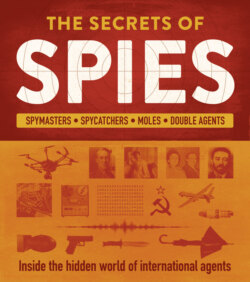Читать книгу The Secrets of Spies - Weldon Owen - Страница 31
На сайте Литреса книга снята с продажи.
ОглавлениеCHAPTER 2 | 1600s–1800s
32
THE AGE OF
DISCOVERY
When Italian explorer Christopher Columbus
sailed across the Atlantic in 1492, he laid the
ground for European domination of the New
World. Spain and Portugal were the early leaders
in this colonial exploitation, soon to be joined by
other European countries, all locked in bitter
rivalry. Military and naval might went hand-in-
hand with the covert battle for good intelligence.
The daring Spanish conquests of the Aztec (Mexico) and
Inca (Peru) empires in the early sixteenth century relied
on the cunning exploitation of the grievances of these
empires’ subject peoples. They provided the military
support that allowed the conquistadors to overcome
what would otherwise have been an overwhelming
material superiority.
FIGHT FOR TERRITORY
The vast wealth in gold and silver taken from the Americas
made Spain the most powerful nation in Europe during the
sixteenth century. But the bullion fleets that regularly
crossed to Spain were tempting targets for the privateers
sailing out of England, France, and the Netherlands. These
new arrivals also wanted a direct share of the New World’s
riches, and they founded their own colonies in the Caribbean
and North America—lands already claimed by Spain.
Spain relied on its powerful army and navy and
consequently paid limited attention to intelligence matters.
Philip II of Spain held a typically aristocratic disdain for the
grubby world of spying, and considered code-breaking to
be a form of witchcraft. Spain’s rivals were less scrupulous,
and their superior handling of the arts of spying helped
compensate for their lesser military strength.
THE RISE OF FRANCE
While Venice had long been preeminent in the intelligence
world, this began to change in the late sixteenth century,
with France gaining a new ascendancy. The mathematician
François Viète, a pioneer in the development of modern
algebra, broke the Spanish diplomatic cipher in 1590. This
gave King Henri IV a vital edge in negotiations with Spain
that led to the settlement of the French Wars of Religion.
Above: French mathematician and
codebreaker François Viète
